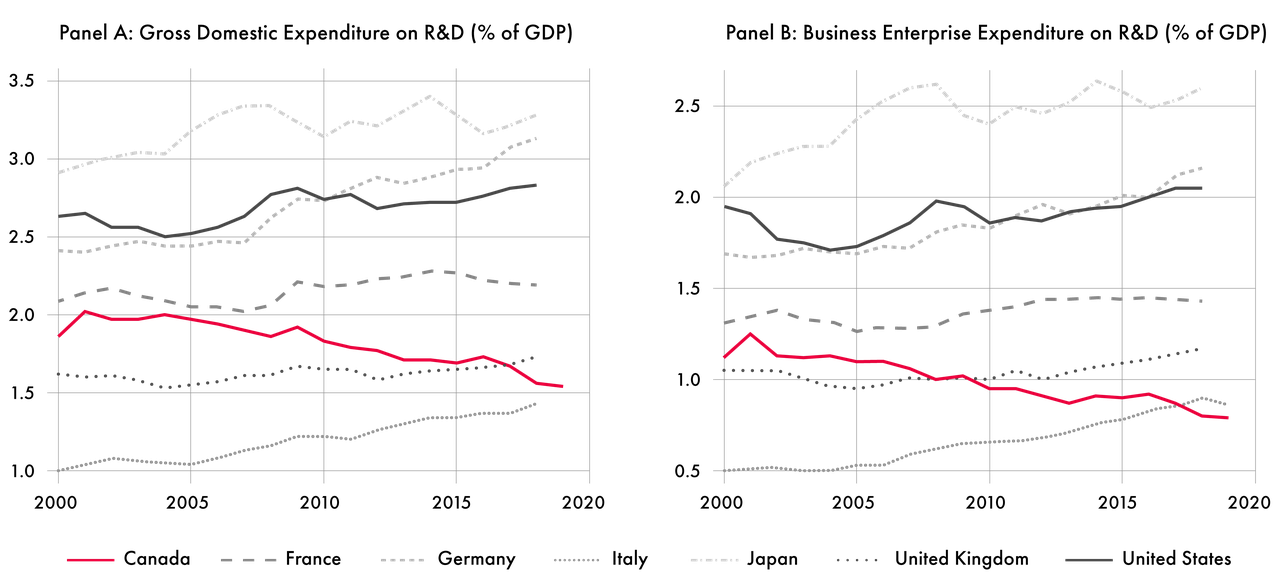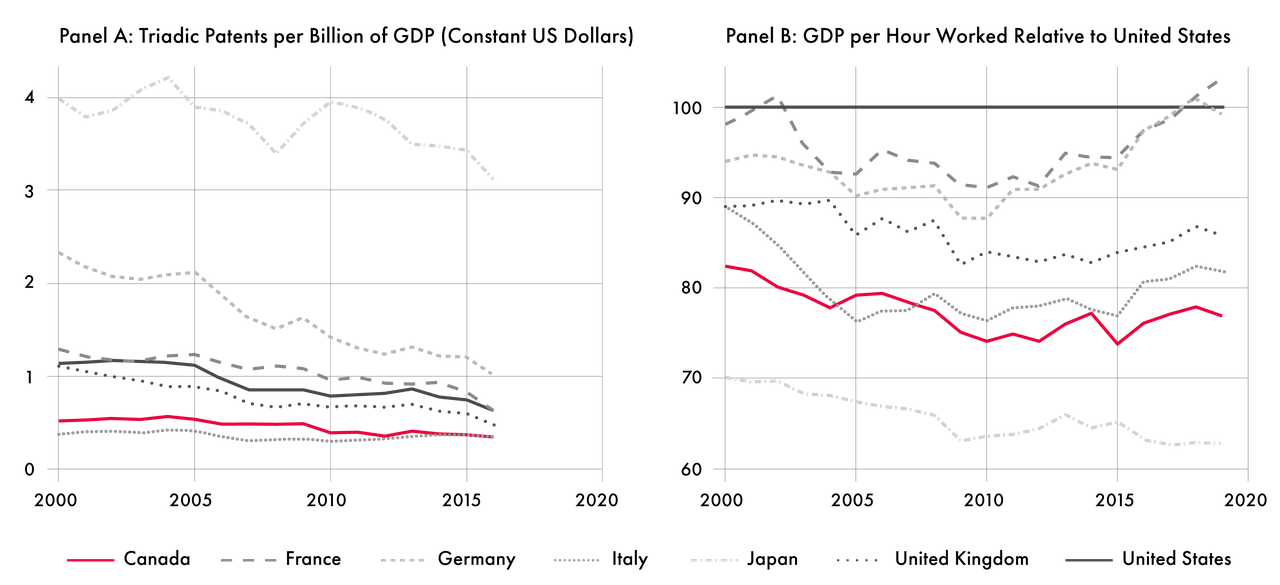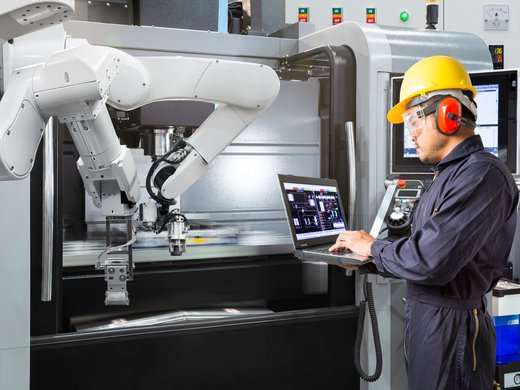Productivity and economic growth have vanished from Canada’s national agenda, and at precisely the wrong time. The COVID-19 pandemic presents an opportunity to transform our economy, but for that we need to end policies that stifle innovation and adopt ones that actively encourage it.
Canada’s innovation and productivity lag that of peer countries and the gap is growing. We are failing to invest in innovation, and our competitiveness, as a result, is deteriorating. According to data from the Organisation for Economic Co-operation and Development (OECD), Canada’s total expenditure on research and development (R&D) has been steadily declining since the turn of the century, while that of all the other Group of Seven (G7) countries has been increasing (Figure 1, Panel A). With Italy set to overtake us, we will soon occupy the last position. The principal reason for this deficit is our feeble private sector expenditures on R&D, an area in which we already find ourselves in last place (Figure 1, Panel B).
Figure 1: Canadian and G7 R&D Expenditures

The picture is just as worrisome in terms of innovation outputs. Canada is in a virtual tie with Italy for the lowest number of inventions patented in each of the European, Japanese and US Patent Offices (so-called triadic patents) as a fraction of GDP (Figure 2, Panel A). Innovation matters because it drives productivity, which in turn determines the standard of living. The average wage of Canadians is closely tied to our productivity, which has been dropping relative to the United States so that Canadians now produce less than 77 cents in goods and services for every dollar produced by our American counterparts in an hour of work (Figure 2, Panel B). In fact, Canada’s labour productivity is now the lowest among G7 countries, save for Japan.
Figure 2: Canadian Patenting Output and Labour Productivity

While these challenges are not new, it is concerning that our innovative and productive deficit is growing.
We have a historic opportunity to reverse this trend and close the gap. Crises have always created an opening for transforming the economy. In Canada, every economic downturn since the beginning of the information and communications technology revolution has resulted in the permanent disappearance of easily automated routine jobs, while non-routine jobs were either not impacted or were able to quickly recover following the downturn. In the United States, the Great Recession resulted in greater technology adoption and increased skill requirements for workers. Beyond fostering automation, economic crises also have a purifying effect on the economy by accelerating the flow of resources and market share from less to more productive firms, and this reallocation also contributes to an overall increase in productivity.
This pandemic offers an unprecedented opening to reinvent our economy, not only because of the scale of the recession, but also because the associated health risks provide strong incentives to automate. The best way for managers to mitigate risks to their operations is to replace human-human interactions with human-machine interactions or, better yet, to replace humans altogether. Sectors like retail, hospitality and manufacturing are already undergoing a transformation, and even the health and education sectors that have not traditionally been subject to automation are experiencing change because they face the greatest health risk exposures. In a recent McKinsey survey, two-thirds of global executives reported an acceleration of automation at their firm.
The opportunity to reinvent our economy must be seized. However, there is reason to be skeptical that we are doing so with current policies. Our economic response to the pandemic thus far can be summarized as seeking to maintain the status quo. Most concerning is the Canada Emergency Wage Subsidy, which stifles product and market innovation by effectively acting as a tax on revenue growth and discourages automation by artificially lowering firms’ labour costs. Moreover, by supporting firms that should be allowed to fail, it is undermining the reallocation process. Statistics Canada data shows that firm closures have been well below trend since July, although that is surely due at least in part to the large shakeout that occurred at the beginning of the pandemic. The propping up of zombie firms by generous pandemic supports is increasingly being recognized as a drag on economic dynamism and recovery.
A second reason to be skeptical is that we are chasing a moving target. Other countries are also experiencing the crisis and, in most cases, have adopted policies that are less focused on maintaining the status quo. For example, most comparator countries either never adopted or have phased out wage subsidies. To narrow the gap, we must not only phase out policies that stifle innovation but also actively promote innovation and technology adoption.
This can take many forms. Businesses that are financially strained due to the pandemic may require financial support so that they can invest in technology and develop new products. Such supports should be directed at businesses that are poised for growth, not ones that are failing to adapt to the new reality. Government policy can also help firms acquire the know-how needed to adopt technology. For example, they can help foster links between small and medium-sized businesses and applied artificial intelligence and robotics research centres, such as the University of Waterloo’s AI Institute and RoboHub.
Perhaps most importantly, innovation and productivity need to once again be on the national agenda. If we are to seize this moment to transform our economy, major COVID-19 policies need to be examined not just from the perspective of immediate health and economic realities, but also for their long-term implications on innovation and productivity. One way to ensure this is done is to establish an innovation advisory group that will work alongside other COVID-19 advisory bodies. Such a group would not only advise on the impact of current policies but also evaluate and recommend new initiatives. Canada is blessed with deep expertise in the areas of innovation and productivity that we could draw on to better navigate the pandemic.
If our objective is to build back better, we must embrace change. Fostering technology adoption and innovation needs to be a major consideration as we navigate the back end of the pandemic and beyond. The need is urgent.
Canada is facing two crises. We can’t afford to be so focused on the first that we ignore a historic opportunity to address the second.



